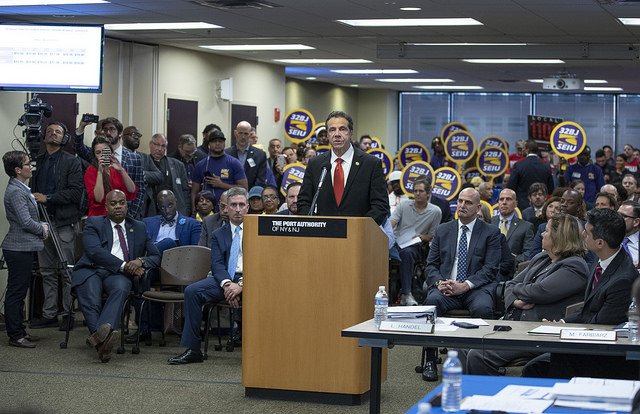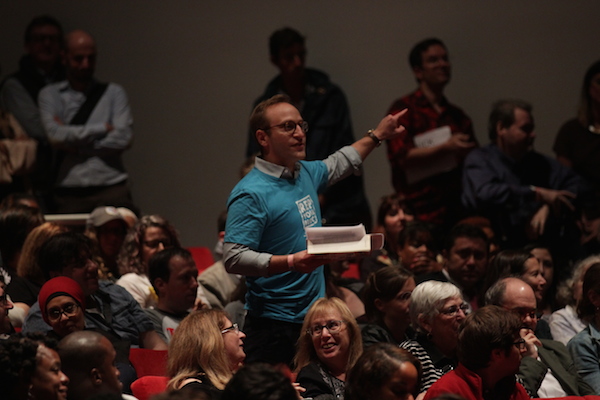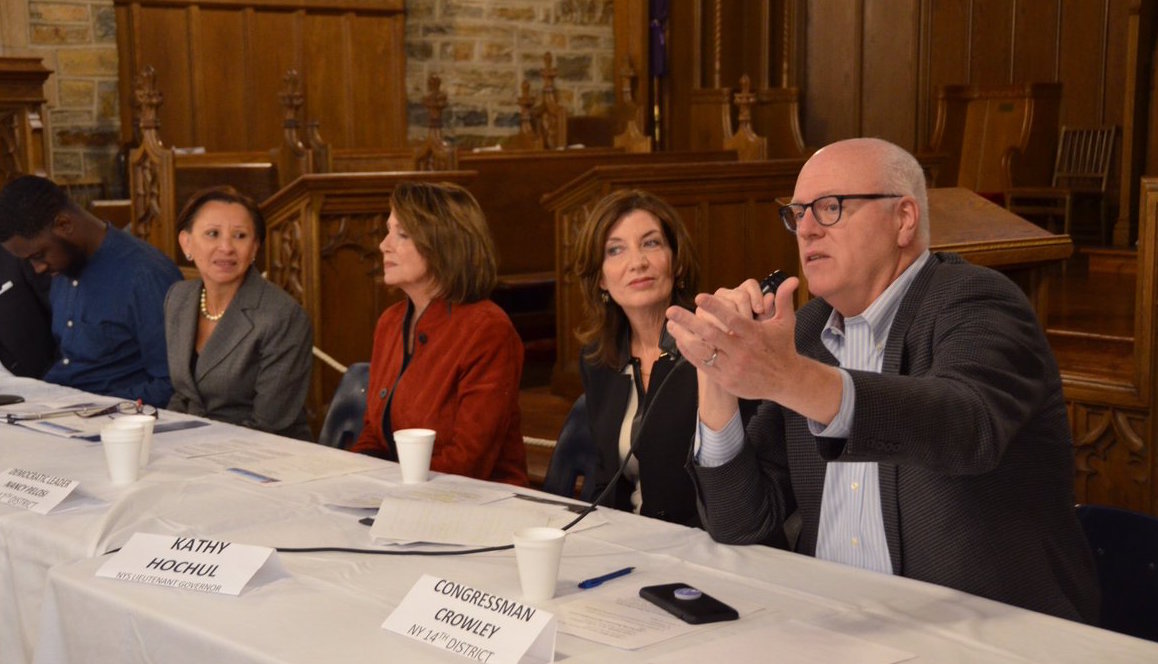Governor Cuomo Must Fulfill His Own Expressed Commitment to Lifting Wages for Struggling Workers

Gov. Cuomo pushes for a higher Port Authority minimum wage (photo: Mike Groll/Governor's Office)
Last week, Governor Cuomo publicly called on Port Authority of New York and New Jersey's Board of Commissioners to pass a higher minimum wage for airport workers. While I, other elected officials, and numerous nonprofit advocates were pleased to see this increase approved, Governor Cuomo has still not fulfilled his commitment to another vital workforce in our state, the human services sector.
Hundreds of thousands of human service employees – the vast majority of whom are contracted by the state – remain unbelievably underpaid, making approximately $23,000-$29,600 per year, with no wage increases since 2010. These rates fall well below the $19 hourly wage the governor called for at the Port Authority, and are also below the average income required to meet the basic living needs of a family. The human services sector is a group comprised of approximately 332,000 New Yorkers – 80% of whom are women, and 50% individuals of color – who provide life changing services to New Yorkers from all walks of life, and are essential to our communities.
These are workers who care for our children, assist those with mental health issues, ensure survivors of domestic violence can rebuild their lives, and care for our aging relatives. Yet they are left with a wage that does not provide economic security of their own. For years, the work of employees in the nonprofit sector has been undervalued; the salaries in the sector are lower than comparable positions in other fields, many of the positions require a college degree but do not compensate accordingly, and stagnant wages result in high turnover.
Not only have state contracts failed to fully fund the wages of these employees, but Governor Cuomo refuses to include common-sense cost of living adjustments (COLA) that would allow these employees to earn a livable wage.
We have fought every single year since Governor Cuomo took office in 2011 for a statutory cost-of-living-adjustment (COLA) for human services employees. To this end, our chief executive has consistently and uncompromisingly deferred from providing any support in this initiative. This inaction has cost the human services workforce almost $500 million in lost wages. We have seen a largely consistent public commitment from the governor in his support of raising wages across New York. This was demonstrated in his remarks last week, in his championing of the $15 minimum wage, and through his outspoken support of pay equity for women. In light of these strong positions, we expect Governor Cuomo to apply this effort to increase the very limited salaries of human service workers.
When this wage increase for Port Authority workers was enacted, the governor stated that “it is paramount that we have a well-trained, secure, stable workforce…Invest in your most important asset, which is your workforce. Fairness, diligence, good business practices all bring one to the same obvious conclusion. Invest in the workforce, raise the minimum wage to $19 over five years. It is the right thing to do. It is the smart thing to do."
We agree, Governor Cuomo. It is time for our state’s leader to make good on his own words, and fund the human services COLA in the next state budget to ensure living wages for this workforce which we our state depends on so heavily in order to build strong communities.
The governor said it best himself: “It is the right thing to do. It is the smart thing to do.”
***
Andrew Hevesi is a member of the New York State Assembly, representing parts of Queens in Assembly District 28. On Twitter @AndrewHevesi.
***
Have an op-ed idea or submission for Gotham Gazette? Email This email address is being protected from spambots. You need JavaScript enabled to view it.
In Keeping Stranglehold, Brooklyn Democratic Party Bosses Further Sow Seeds of Their Demise

Kings County Democratic Committee meeting (photo: James Boo, New Kings Democrats)
This summer I collected signatures from neighbors to represent my election district, an area of a few blocks, as a member of the Kings County Democratic Committee (KCDC), the Brooklyn denomination of the New York State Democratic Party.
I had signed up with the #RepYourBlock campaign, convened by New Kings Democrats (NKD), one-and-a-half years earlier for this purpose. I handed in my petitions in June and a few months later I received a postcard informing me of KCDC’s bi-annual rules meeting, on September 27 at Kingsborough Community College. This postcard let me know that if I signed and returned it to Frank Seddio, the Democratic County Chair, there would be no need for me to attend. Despite this “helpful” suggestion that I turn over my vote through this proxy before ever even participating in a meeting, I made plans to be there.
The hundreds of people gathered in the Leon M. Goldstein Performing Arts Center on September 27 ranged from newly-minted members like myself to people who had been attending for decades. From the beginning, it was clear that the party leadership was overwhelmed by the turnout. It was less clear whether that was by design or by incompetence.
We waited two-and-a-half hours past the posted start time for the meeting to begin. It was standing room only, and the people around me were palpably excited to participate in this most local form of government. When the meeting finally began, it got off to a contentious start. KCDC members heckled from the back of the room. The person leading the meeting, former State Senator Martin Connor, never introduced himself and was immediately defensive. Many of us had trouble following what was happening in a poorly-mic'd room with a lot of background noise.
In the weeks leading up to the meeting there had been heightening tension around the efforts of NKD, a reform club trying to increase the participation of everyday Brooklynites through the #RepYourBlock campaign. NKD had reached out to Democratic County Committee members encouraging them to attend the meeting and if they couldn’t, asking that they give their proxy to someone they know or one of the #RepYourBlock partners, in an attempt to counter the juggernaut of the party leadership proxy-collection machine. Many committee members received multiple requests for their proxy (a way to allow someone else to vote in your absence), including a misleading one from party leadership that purported to be signed by one’s state Assembly member and district leaders (many of whom claimed this happened without their permission). Partially in response to this, there was a proposal to reform the proxy system introduced by my own Assembly member, Robert Carroll, which was overwhelmingly supported.
Then the time came for the vote that is one of the only real roles for members like me – voting for the officers of the executive committee. This year an actual competitive election was possible, because an alternate “reform” slate had been proposed by #RepYourBlock. The voting began, and an already tense meeting unmistakably changed.
Because we didn’t even get the chance to vote!
It was over before it started. Party leadership had waited to start the meeting until they were sure that Frank Seddio had enough proxy votes to overrule anything that happened. The voting began with a vote on the complete executive committee slate, and motions for a vote on each individual position were overruled or just flat out disregarded. When the vote was called for the establishment slate, about 50 people stood up. Martin Connor said those 50 votes, plus the more than 500 proxies held by Frank Seddio, meant the establishment slate won.
Even when those numbers were questioned, or when it was pointed out that the numbers didn’t seem to add up, or when it was clear that the numbers being reported were actively changing as more proxies appeared with every challenge, we were told “It’s done” and the meeting moved on.
In that room there were hundreds of people like me who had petitioned to be on County Committee, some of whom had competed in primaries. Over 500 people had left work early, skipped dinner, planned for childcare, carpooled, rode a subway to a bus, or made countless other arrangements, all to come to Manhattan Beach on a weeknight and attend a five-hour meeting. And the overwhelming majority were not even able to stand up and be counted in favor of a candidate they supported. Their questions and requests for explanation or clarification were dismissed and they were scolded from the lectern for daring to even ask them.
When a motion was made to recount the vote, after a member pointed out that the numbers given did not add up to an establishment victory, the vote in favor of recount was overwhelming. That vote was also unsuccessful, as Seddio’s proxies still outnumbered those in attendance. But the room had shifted, and even people who had voted for the establishment slate saw what was happening as counter to a democratic process. NKD and #RepYourBlock had inspired us to show up and be a part of our local political process, and the Kings County Democratic Party saw us as an obstacle.
The Brooklyn Democratic Party leadership did more for reform with its actions in that auditorium than years of organizing could have.
It is a testament to the efforts of #RepYourBlock that so many people were there. And by being so entrenched, and so unwilling to allow for anything that might dilute their stranglehold on Brooklyn politics, party leadership ensured that the proxy abuse they are so reliant on is in its final days.
***
Nicole Hunt is a member of New Kings Democrats, on the Executive Committee of Brooklyn Voters Alliance, and a member of the Kings County Democratic Committee. On Twitter @msnicolemh.
***
Have an op-ed idea or submission for Gotham Gazette? Email This email address is being protected from spambots. You need JavaScript enabled to view it.
Discouraged But Determined; Queens County Committee Will Change

Queens County Democratic leader Joe Crowley (photo: @repjoecrowley)
This summer, the New York Times reported that candidates to become Democratic committee members in Queens were unaware that they were running for office and would be on the September 13 ballot. Queens Democratic Party bosses were nominating candidates without their consent for County Committee membership. You read that right.
Those party bosses, long-term incumbent elected officials also known as establishment Democrats, tried to prevent new, more progressive Democratic candidates from entering these local races. Their preference is, of course, to to maintain the status quo.
As a young Democrat passionate about public service, hearing about this corrupt electoral process happening in my backyard left me feeling discouraged. To live in an equitable society, establishment Democrats need to know not to partake in antiquated, exclusionary practices. In order to have a united Democratic Party there has to be a process where everyone can participate; wherein elections are open, transparent, and inclusive. By nominating candidates without their consent, establishment Democrats not only lose credibility, but they jeopardize the very foundations of our democratic process, the bedrock of our nation. They keep my home borough of Queens from progressing and marginalize people that actually want to get involved.
Many Democratic voters are beginning to support progressive candidates that distance themselves from the current establishment. I think back to the congressional primary win of Alexandria Ocasio-Cortez in June as well as the recent primary wins of progressives at the state level and feel encouraged that new candidates challenging incumbents approach their campaigns through a more just lens. New progressive Democrats are taking a stance that fights for economic, social, and racial justice for all and reject corporate PAC and corporate lobbyist money. This is a message to Democratic Party bosses that Democratic constituents will not wait for establishment incumbents to change unjust systems and practices.
Democrats who are too content with the status quo and sitting down on progressive issues will run the risk of not being reelected. While many establishment Democrats point at Republicans as the ones to blame for failing systems, mismanagement of funds, and the reason for many of the faults in our society, it’s easy to see that establishment Democrats are not much better. It’s time to look inward first. In order for current establishment Democrats to avoid strong primary challengers and continue winning elections against Republicans, they have to make sure that members of their party are engaged, included, and not being shunned by dishonest electoral processes. We need Democrats who ensure elections are just and not being controlled by the party bosses at the top.
Although some establishment Democrats can tout years of experience and successes, if they have not done anything to change the electoral system, or have been too complacent, then many of their efforts are in vain. Winning campaigns through systemic malpractices does not make you an exemplary candidate. As we can see from the recent loss of seven Democratic incumbents in state Senate primaries, establishment Democrats have to be true to their Democratic electorates, take more action to change electoral systems, be more inclusive, and give a voice to more people in their communities. If they fail to do so, constituents from their districts will make sure to elect new progressive Democrats to take their seats.
As an aspiring professional in the field of public service, a Democrat, and a young person wanting to see change, machine politics do not interest me. Though discouraged by the practices of establishment Democrats, I am motivated to get more involved and work to change the unjust systems that currently exist, calling them out, and taking action. I urge my fellow Queens constituents and those around the city to elect the Democratic leaders that are transparent, honest, and committed to electoral integrity, from the local County Committee all the way up.
***
Giovanni Barcenes is an MPA Candidate at the NYU Robert F. Wagner Graduate School of Public Service and lifelong New Yorker born and raised in Queens. On Twitter @GioBarcenes.
***
Have an op-ed idea or submission for Gotham Gazette? Email This email address is being protected from spambots. You need JavaScript enabled to view it.




